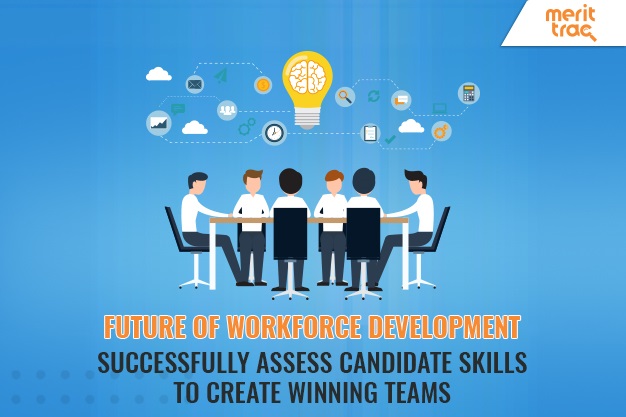
Future of Workforce Development: Successfully Assess Candidate Skills to Create Winning Teams
Date: 05/07/2018 | Posted by: MeritTrac | Category: Corporate , Skills Assessment , Workforce Development
Forward-looking companies such as Reliance and Amazon India are making aggressive investments in digital technologies to boost efficiency and grow their business. As digital transformation disrupts the workplace, one critical factor that determines digital success is the skill levels of an organization’s workforce. Without talented employees skilled in transformative technologies such as Artificial Intelligence, big data analytics and virtual reality, companies will struggle to succeed in the digital economy. What’s more, as industry 4.0 evolves, employees capable of using the latest technological advances will become increasingly scarce. According to a Capgemini report on Digital Talent Gap, more than 59% of organizations already face shortages in soft digital skills such as customer centricity, passion for learning and collaboration and 51% in hard digital skills such as cybersecurity, cloud computing and analytics. What does this mean for companies?
With the future of work marked by rapid advances in technology, hiring employees with skills in IoT, big data analytics, 3D printing and social and mobile platforms is pivotal. But how can companies do this in a scalable and effective manner? An assessment platform offers the promise of rapidly assessing candidate proficiency; identifying current skill levels and building training programs to address gaps and develop new skills, leading to competitive advantage.
Here are three ways in which an assessment platform can help an organization meet their digital needs to rapidly traverse their digital transformation journey:
#1 Discover new skill sets and identify skills gap
Lack of digital skills is a growing hurdle to successful digital transformation. Yet, only 64% of organizations in India are responding to the widening skills gap. An assessment platform can change the way companies identify the current skill levels and address employee skills gap. It enables companies to identify new skill sets required to succeed in the workplace of the future and compare them to the actual skill level of the employees. For instance, organizations can explore the skill demands of emerging job roles such as Devops, Data Science and Data Architect to measure the skills gap, and leverage relevant courses to up-skill their employees.
#2 Upskill employees
Once the platform identifies the skill gap, it creates custom pathways for learners to enhance their proficiency in futuristic technologies such as IoT, VR and 3D printing. By leveraging a powerful AI engine, an assessment platform helps identify the right courses and learning content for employees. Through research-based frameworks and robust learning experiences, the platform then trains employees in the right skill sets across four stages – explorer, beginner, sprinter and achiever.
#3 Assess skill proficiency
An assessment platform helps businesses objectively analyze employee’s critical thinking skills, domain expertise, and ability to learn, digest and apply new information. The result: the ability to map skills to the job role, predict job performance and fit and recruit competitive and highly motivated individuals who can help companies meet their digital initiatives.
Job roles are evolving at warp speed, driven by extensive innovation, automation, and emerging digital platforms. Pre-employment assessments help in finding job-fit candidates, and improve retention and workforce engagement, but only if companies have right assessment expertise. MeritTrac’s suite of standardized assessments enables the organization to leapfrog the competition by acquiring best-fit talent. The company’s strong test research and development team help build customized assessments to meet unique business needs for strategic talent acquisition, driving sustained growth and profitability.
Source:
- forbes.com
- inc42.com
- capgemini.com












 Sales Hotline: USA: +1 646 916 0939 / Others: +91 80619 14700
Sales Hotline: USA: +1 646 916 0939 / Others: +91 80619 14700


